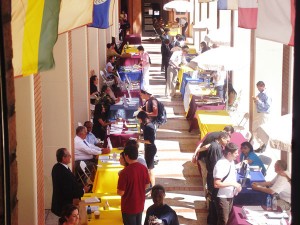Students share ideas at Innovator Showcase Competition
More than 100 students exhibited their entrepreneurial ideas Friday at the 2010 USC Student Innovator Showcase and Competition.

Think tank · Fifty-three teams of students from all majors displayed their work at the Student Innovator Showcase and Competition Friday. - Neha Jain | Daily Trojan
The showcase, hosted by the USC Stevens Institute for Innovation, was held from 11 a.m. to 2 p.m. in the Von KleinSmid Center courtyard. The goal of the event was to give students from across the university, both graduates and undergraduates, the opportunity to present and explain their breakthrough ideas, said Dana Rygwelski, senior marketing coordinator at the Stevens Institute.
“The showcase is a great way to demonstrate the creative thinking that takes place here at USC and the research that is done to change our world and the future,” Rygwelski said.
The annual Student Innovator Showcase and Competition began in 2007 and has since become a part of Trojan Parents Weekend. All USC students were eligible to submit an application for the showcase. Overall, 87 teams applied, of which 53, consisting of more than 100 students, were chosen to exhibit their ideas.
The first-place team, winners of the Most Innovative Award, developed a web-based platform where users can view videos documenting local social problems and work together to generate new methods of approaching these problems. The creators named their platform Sangha, the Sanskrit word for community.
Sangha’s co-founders, Jesse Goldberg, Sarayu Ramanan, Zlatan Sehovic and Crystal Cheng, said they began their project in India before expanding it at USC.
“It’s really exciting. We worked on the idea for almost six months,” said Goldberg, a graduate student studying business administration. “There’s really big potential.”
The second-place team, Dish Dash, won the Most Promising Business Concept Award, a prize funded by the Diem Shotwell Metcalfe Family Fund at the USC Marshall School of Business.
Created by undergraduate students Michael Garrido, Tracy Lawrence, Maggy Wahba and Gary Yao, Dish Dash is an online and mobile student guide to dining discounts. By partnering with restaurants, the creators hope to bridge the gap between restaurants and USC students.
Participants said they were pleased with the feedback they received from those who visited the showcase.
“It means so much to a business that’s just starting,” said Lawrence, a senior majoring in business administration.
The first runner-up, Farhan Baluch, a fifth-year graduate student studying neuroscience, developed a system of using locusts as a biological sensor for high-speed mobile robots called Locus-Bot.
The second runner-up, Jona Xiao, a senior majoring in business administration and critical studies, developed the PlayDate Online Dating Game. The game is targeted at young people, who want to find romance online without using sites such as Match.com. Users participate in a number of games, such as “Would You Rather,” to evaluate their own values and thought process.
Other ideas at the showcase included projects from detachable high heels to bicycles that could be transformed into their own locks.
“I really want to put this in the market,” said Winnie Lam, a junior majoring in industrial and systems enginnering and creator of the detachable high heel.
Lam said the showcase helped her determine who would be the target consumer for her product.
According to Rygwelski, the event generated interest from a very diverse student audience. The teams were composed of students from a number of USC’s schools.
“The participants are from all corners of the university,” Rygwelski said.
Representatives from the USC Stevens Institute, the Lloyd Greif Center for Entrepreneurial Studies at USC and many field experts judged the event. Each judge spoke with all participants at the showcase to determine which projects would be selected for the 10 finalists.
These finalists were then invited to give two-minute pitches of their ideas in front of the panel of judges at Tommy Trojan later that day. From these speeches, judges selected the first-place winner, second-place winner and two runners-up. All four teams won cash prizes and a skateboard.
For many students who participated in the showcase, the potential for their ideas will expand because of the exposure.
“For the last three years, the three companies that have won have gone on to have business success,” Rygwelski said.
Richard Hull, the senior director of New Ventures and Alliances at the USC Stevens Institute and the master of ceremonies, said he believes USC students have the potential to dramatically change the way they live.
“USC students think big,” Hull said. “I think innovation is key to society in making an impact in people’s lives. This event is a great way to bring people together.”
